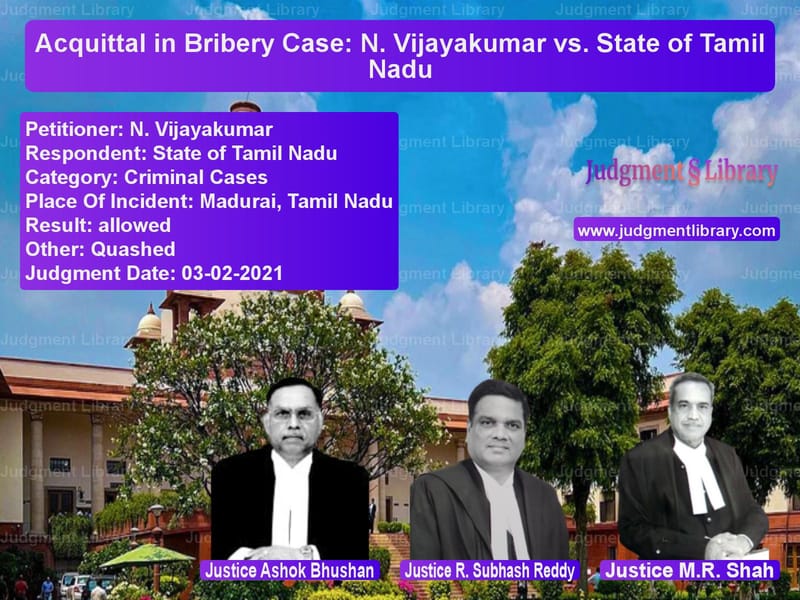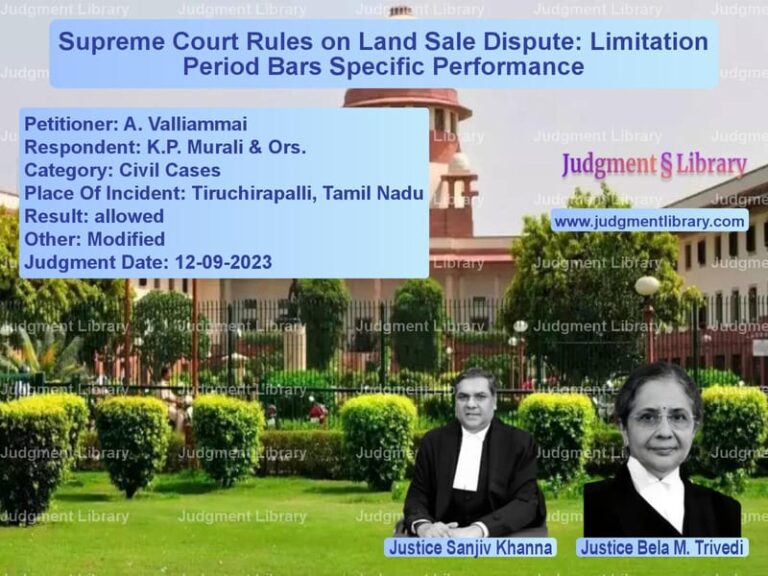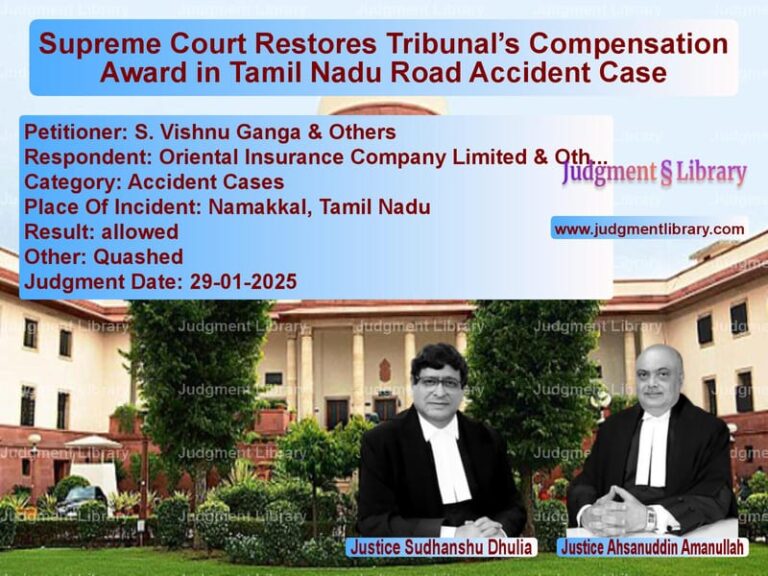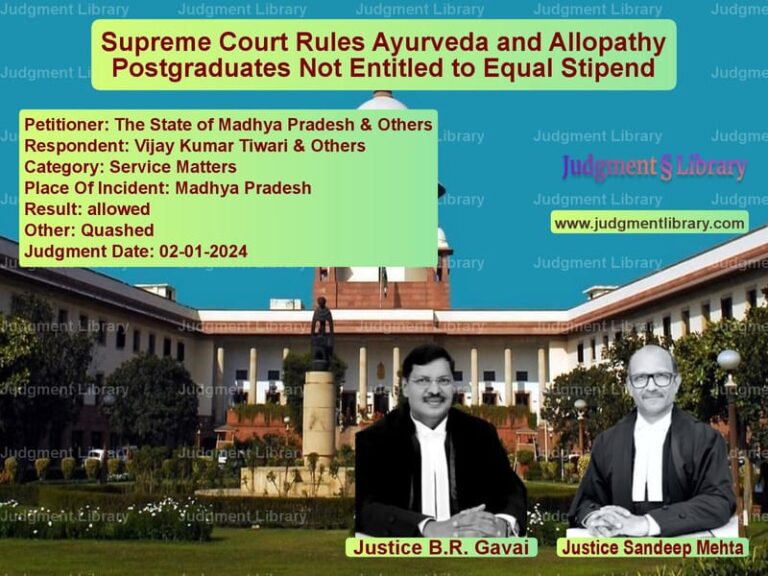Acquittal in Bribery Case: N. Vijayakumar vs. State of Tamil Nadu
The case of N. Vijayakumar vs. State of Tamil Nadu is a significant ruling on corruption charges against public servants under the Prevention of Corruption Act, 1988. The Supreme Court examined whether the High Court erred in reversing the trial court’s acquittal and convicting the accused in a bribery case.
Background of the Case
The appellant, N. Vijayakumar, was working as a Sanitary Inspector in Ward No. 8 of the Madurai Municipal Corporation. He was accused of demanding a bribe of Rs. 500 and a mobile phone from D. Gopal, a supervisor in the Neat And Clean Service Squad (NACSS), a voluntary service organization that was awarded sanitation work on a contract basis.
The prosecution alleged that the appellant demanded the bribe to process an extension of NACSS’s sanitation work contract beyond March 2003. Based on this complaint, a trap was laid, and the appellant was allegedly caught red-handed accepting the bribe on October 10, 2003.
He was charged under Sections 7, 13(2), and 13(1)(d) of the Prevention of Corruption Act, 1988. The trial court acquitted him on February 25, 2014, due to inconsistencies in the prosecution’s evidence. However, the Madras High Court reversed the acquittal and convicted the appellant, sentencing him to rigorous imprisonment for one year and imposing a fine of Rs. 5000.
The appellant challenged this conviction in the Supreme Court.
Key Legal Issues
- Whether the High Court was justified in overturning the trial court’s acquittal.
- Whether the prosecution had proven the bribery demand and acceptance beyond a reasonable doubt.
- The significance of procedural lapses in conducting the trap operation.
- Whether the presumption of innocence should be reinforced due to acquittal by the trial court.
Arguments by N. Vijayakumar
- The appellant argued that the trial court had correctly acquitted him by finding inconsistencies in the prosecution’s case.
- He contended that the prosecution’s key witness, D. Gopal (PW-2), had animosity towards him and had falsely implicated him.
- He pointed out that the bribe money was not recovered directly from him but from a table drawer, raising doubts about the alleged demand and acceptance.
- He emphasized that the delay in conducting the phenolphthalein test (from 5:45 PM to 7:00 PM) compromised the integrity of the evidence.
- The appellant also argued that the High Court failed to establish that the trial court’s acquittal was not a possible view.
Arguments by the State of Tamil Nadu
- The prosecution maintained that the appellant had explicitly demanded and accepted the bribe, as evidenced by the testimony of PWs 2, 3, 5, and 11.
- The state argued that the trap proceedings were conducted in accordance with the legal requirements, and the presence of tainted currency in the drawer was sufficient to prove bribery.
- The prosecution contended that the trial court had overlooked the prosecution’s strong evidence, necessitating intervention by the High Court.
- The state also emphasized that Section 20 of the Prevention of Corruption Act creates a presumption of guilt once acceptance of illegal gratification is established.
Supreme Court’s Analysis
The Supreme Court examined whether the trial court’s acquittal was a possible view and whether the High Court had valid grounds to reverse it. The Court made the following key observations:
- “A conviction under the Prevention of Corruption Act requires proof of demand and acceptance of illegal gratification.”
- “The mere recovery of tainted money, without proof of demand and voluntary acceptance, is insufficient for conviction.”
- “The presumption under Section 20 of the Act arises only after the prosecution proves that the accused had demanded and accepted the bribe.”
- “Where two views are possible, the High Court should not interfere with an acquittal unless the trial court’s decision is perverse or based on an erroneous view of law.”
The Court also highlighted that:
- The prosecution’s witnesses had inconsistencies in their testimonies.
- The delay in conducting the phenolphthalein test created doubts about the integrity of the trap operation.
- The bribe money was found in a table drawer, and there was no direct evidence of acceptance.
Final Judgment
The Supreme Court allowed the appeal and set aside the conviction, ruling that:
- The trial court’s acquittal was a possible view based on the evidence.
- The prosecution failed to prove demand and voluntary acceptance of the bribe beyond a reasonable doubt.
- The High Court erred in reversing the acquittal without demonstrating that the trial court’s findings were perverse.
- The appellant was to be released immediately from custody.
Implications of the Judgment
This ruling has significant implications for corruption cases:
- It reinforces the principle that demand and acceptance of a bribe must be proven beyond a reasonable doubt.
- It highlights that mere recovery of money is insufficient for conviction.
- It establishes that appellate courts should not interfere with acquittals unless the trial court’s decision is demonstrably flawed.
- It ensures that procedural safeguards are strictly followed in corruption investigations.
Conclusion
The Supreme Court’s decision in N. Vijayakumar vs. State of Tamil Nadu underscores the importance of fair trials in corruption cases. It emphasizes that an accused should not be convicted based on suspicion alone and that prosecution evidence must meet the highest standards to secure a conviction. This judgment serves as an important precedent for ensuring justice in bribery and corruption cases.
Petitioner Name: N. Vijayakumar.Respondent Name: State of Tamil Nadu.Judgment By: Justice Ashok Bhushan, Justice R. Subhash Reddy, Justice M.R. Shah.Place Of Incident: Madurai, Tamil Nadu.Judgment Date: 03-02-2021.
Don’t miss out on the full details! Download the complete judgment in PDF format below and gain valuable insights instantly!
Download Judgment: n.-vijayakumar-vs-state-of-tamil-nadu-supreme-court-of-india-judgment-dated-03-02-2021.pdf
Directly Download Judgment: Directly download this Judgment
See all petitions in Money Laundering Cases
See all petitions in Fraud and Forgery
See all petitions in Bail and Anticipatory Bail
See all petitions in Custodial Deaths and Police Misconduct
See all petitions in Judgment by Ashok Bhushan
See all petitions in Judgment by R. Subhash Reddy
See all petitions in Judgment by Mukeshkumar Rasikbhai Shah
See all petitions in allowed
See all petitions in Quashed
See all petitions in supreme court of India judgments February 2021
See all petitions in 2021 judgments
See all posts in Criminal Cases Category
See all allowed petitions in Criminal Cases Category
See all Dismissed petitions in Criminal Cases Category
See all partially allowed petitions in Criminal Cases Category







